Introduction
In the fast-paced and demanding world we live in, it’s easy to get caught up in the daily grind without taking the time to reflect on our own lives. Self-inventory, also known as self-assessment or self-reflection, is a powerful tool that enables individuals to gain deeper insights into themselves, their values, strengths, weaknesses, and aspirations. By engaging in a comprehensive self-inventory, we can uncover our true potential, make informed decisions, and embark on a journey of personal growth and fulfillment.
Understanding Self-Inventory
Self-inventory involves a systematic and honest evaluation of various aspects of our lives. It goes beyond superficial examination and delves into the core of who we are as individuals. This process typically encompasses several key areas:
Values and Beliefs: Identifying and understanding our core values, principles, and beliefs provides a solid foundation for self-awareness. This step helps us align our actions and decisions with what truly matters to us.
Strengths and Weaknesses: Understanding your inherent strengths empowers you to apply them effectively. This application enhances numerous aspects of life, including relationships, careers, and personal interests.
Acknowledging our weaknesses, on the other hand, opens up opportunities for improvement and growth.
Interests and Passions: Exploring our interests and passions helps us find activities and pursuits that bring us joy and fulfillment. By aligning our lives with what genuinely excites us, we can cultivate a sense of purpose and satisfaction.
Goals and Aspirations: Setting meaningful and realistic goals is crucial for personal development. Self-inventory helps us clarify our aspirations, both short-term and long-term and allows us to create actionable plans to achieve them.
The Benefits of Self-Inventory
Enhanced Self-Awareness: Self-inventory promotes a deeper understanding of ourselves, our motivations, and our behaviors. By becoming aware, we can deliberately choose actions that reflect our core values and desired outcomes. This mindful approach cultivates genuine self-expression and strengthens our personal integrity.
Improved Decision-Making: By knowing our strengths, weaknesses, interests, and aspirations, we can make informed decisions that are more aligned with our true selves. Self-inventory empowers us to evaluate options objectively, leading to better choices in various aspects of life.
Personal Growth and Development: By conducting a self-inventory, we can pinpoint areas that require improvement and growth. This identification then allows us to implement focused strategies to enhance our skills, knowledge, and abilities. This self-improvement journey can lead to increased self-confidence, resilience, and adaptability.
Enhanced Relationships: Understanding ourselves better allows for more meaningful connections with others. Understanding our own communication patterns, emotional triggers, and core values is crucial. This self-awareness enables us to build genuine connections, promoting both mutual understanding and empathy within our relationships.
Increased Fulfillment and Well-Being: Engaging in self-inventory helps us align our lives with our passions and values. When your actions align with your core values, you cultivate a strong sense of purpose. This alignment results in increased fulfilment and improved overall well-being because your time and energy are devoted to what holds genuine significance for you.
Practical Tips for Self-Inventory
Create dedicated time: Set aside regular periods for self-reflection, whether it be weekly, monthly, or annually. Find a quiet and comfortable space where you can focus on introspection without distractions.
Ask meaningful questions. Challenge yourself with thought-provoking questions such as “What are my core values?” “What activities make me lose track of time?” or “Where do I see myself in five years?” These questions will help you delve deeper into your inner self.
Utilize self-assessment tools: There are numerous online resources and assessments available, such as personality tests, strength finders, or value inventories. These tools can provide additional insights and structure to your self-inventory process.
Seek feedback: To gain valuable self-insight, discuss your strengths, weaknesses, and goals with trusted individuals. Their diverse perspectives can offer a clearer understanding of your potential and direction. Their insights can complement your reflection process.
Keep a journal. Document your self-inventory journey in a journal. Write down your thoughts, reflections, and action plans. Reviewing these entries over time will help track your progress and provide valuable insights into your growth.
Conclusion
Self-inventory is a transformative process that allows individuals to gain a deep understanding of themselves, their values, strengths, weaknesses, and aspirations. By embarking on this journey of self-discovery, we can make informed decisions, foster personal growth, and ultimately live a more fulfilling and authentic life. Taking the time to engage in self-inventory is a powerful investment in ourselves that can lead to a lifetime of happiness and success.

